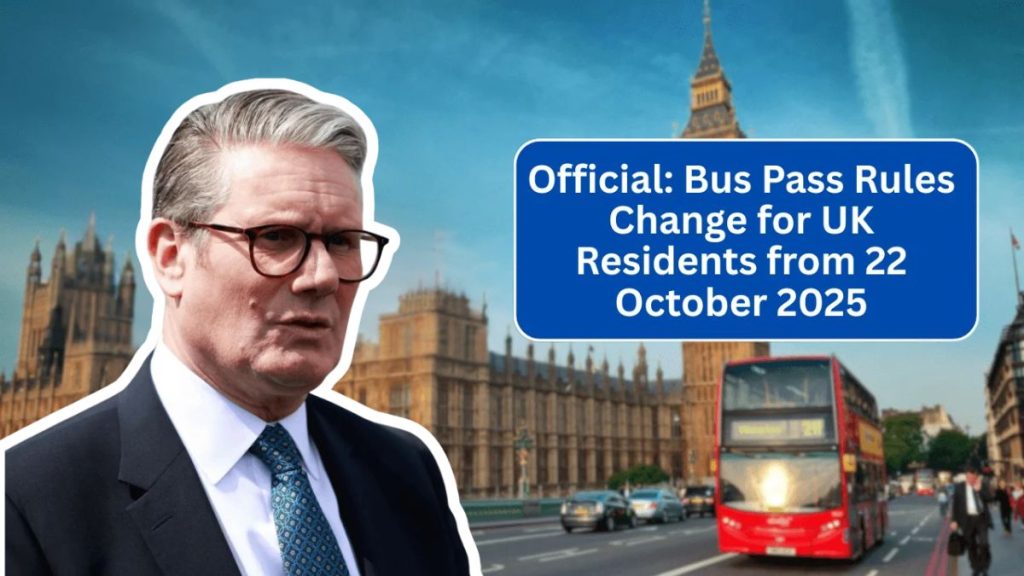The UK Government has officially confirmed a major update to free bus pass eligibility rules, taking effect from 22 October 2025. This change will significantly impact millions of residents across England, Wales, and Scotland — particularly pensioners, disabled individuals, and low-income households who depend on concessionary travel for everyday needs such as commuting, healthcare appointments, and social activities.
Aligning Bus Pass Age with State Pension Age

From 22 October 2025, eligibility for a free bus pass will be directly tied to the State Pension Age. This marks a shift from the existing structure, where in some regions, residents could apply at a fixed age of 60 or 66.
This new policy means that if the State Pension Age rises again in the future — as is expected in the coming years — the bus pass age will automatically increase alongside it.
Essentially, there will no longer be a single national age rule. Instead, eligibility will fluctuate with the pension framework, which the government reviews regularly to reflect longer life expectancy and labour market changes
Why the Government Is Changing the Rule
Officials have explained that the reform is driven by growing financial pressures on local transport budgets and the need to ensure that benefits remain sustainable as the population ages.
According to the Department for Transport, the main goals behind the change include:
- Aligning concessionary travel with pension system reforms.
- Reducing financial strain on local councils struggling with transport subsidies.
- Encouraging older adults to remain in work longer.
- Creating a fairer benefit system linked to current economic realities.
This move is part of a wider trend where multiple welfare schemes — including free prescriptions, winter fuel payments, and pension credit eligibility — are being adjusted to reflect the State Pension Age.
Who Will Be Most Affected by the New Rule
The most affected group will be those currently aged 59 to 61, who were preparing to apply for a bus pass in 2025 or 2026. These individuals may now have to wait longer, depending on how their State Pension Age aligns with the new policy.
Groups likely to be impacted include:
- Near-retirement workers in their late 50s and early 60s.
- Future retirees, who may face longer waits as the pension age continues to rise.
- Disabled individuals, who will still qualify earlier but under stricter verification processes.
For instance, those who were expecting to apply at 60 may now need to wait until they reach the State Pension Age — currently 66 years, but set to rise to 67 by 2028.
Regional Differences: England, Wales, and Scotland
While the reform is national in scope, implementation will vary by region, as local governments control specific transport programs.
- England: Eligibility will now strictly follow the State Pension Age.
- Wales: Currently allows bus passes from age 60, but a review of that rule is expected after October 2025.
- Scotland: Also retains the age 60 threshold for now, though ministers have indicated a similar review may follow.
- London (Freedom Pass): Expected to mirror the national pension reforms, but a London-specific update will be announced separately.
Experts predict that within a few years, all regions will align their policies with the national pension framework, ending the current differences between countries.
Disabled Residents: Continued Support but Stricter Checks
Disabled residents will continue to qualify for free or discounted travel, but councils will apply stricter documentation checks to confirm ongoing eligibility.
Acceptable proof may include:
- Personal Independence Payment (PIP) confirmation.
- Employment and Support Allowance (ESA) documentation.
- Official mobility or disability registration proof.
Those with long-term disabilities will remain covered, but local councils will periodically re-verify medical evidence to prevent misuse or outdated records.
Why the Change Has Sparked Public Debate
The announcement has sparked mixed reactions across communities. Pensioner groups, trade unions, and social organizations have criticized the policy, arguing that it unfairly penalizes older citizens who rely on public transport for essential travel.
Campaigners say delaying access to free travel could increase social isolation, financial hardship, and mobility issues — especially for those who cannot drive or afford rising transport fares.
Others argue that the policy contradicts efforts to encourage sustainable travel and reduce car dependency among older adults.
However, supporters of the reform argue that it is necessary to maintain the financial health of the concessionary travel system. They highlight that the average Briton now lives longer and works later, which should be reflected in benefit timelines.
How to Check If You Qualify Under the New Rules
Residents approaching the eligibility age are advised to review their status early to avoid confusion.
Here’s what you can do now:
- Check your State Pension Age on the official GOV.UK calculator — your bus pass age will now match it.
- Gather documents early — proof of age, residency, or disability evidence if applicable.
- Monitor local council updates, as implementation may vary by area.
- Consider alternative travel options, such as discounted regional smart cards or community transport schemes.
Preparing early ensures you won’t miss your eligibility window or experience delays when applying.
Will Current Bus Pass Holders Be Affected?
The government has reassured existing pass holders that their benefits will remain valid. If you already have a free bus pass, you are unlikely to lose it after October 2025.
However, renewal verification checks may become stricter. Councils will likely request up-to-date documents to confirm age, address, and disability status before renewing passes.
This process aims to ensure accurate records and prevent fraudulent claims while keeping genuine users fully covered.
Expert Opinions on the Policy Shift
Transport analysts view this decision as part of the government’s broader fiscal realignment — one that balances public spending with demographic realities.
Economists argue that while the reform helps contain transport costs, it could disproportionately affect low-income pensioners who rely on public transport to access healthcare and community services.
Some experts propose introducing a transitional discount scheme for those aged 60–65, offering partial fare relief until they reach the new eligibility age. Whether this will be adopted remains uncertain and will depend on budget negotiations and public pressure in 2026.
Impact on Local Communities
Local councils are expected to face administrative challenges as they update eligibility systems and handle increased public inquiries.
Rural areas may be hit hardest since older residents often depend heavily on bus services for shopping, social visits, and medical appointments. Delaying eligibility could risk social isolation among those who already face limited transport access.
Urban centres, meanwhile, may experience fewer disruptions due to alternative travel schemes like the Freedom Pass or discounted contactless fares.
What Older Adults Should Do Now
To ensure you remain prepared for the October 2025 rule change:
- Check your pension and bus pass age alignment.
- Apply for Pension Credit or disability benefits early, as they can still grant earlier eligibility in certain cases.
- Stay updated via local council announcements or GOV.UK newsletters.
- Keep your documents ready for quick renewal or reapplication.
- Explore discounted or off-peak travel options available in your area.
By planning ahead, you can avoid disruptions and continue to enjoy affordable, reliable public transport access.
Broader Connection to Pension and Welfare Reforms
This bus pass reform is not an isolated decision. It aligns with wider government efforts to standardize benefit eligibility based on the State Pension Age — affecting areas like free prescriptions, winter fuel payments, and TV licence exemptions.
The aim, officials claim, is to create a “fair and financially sustainable” welfare system that keeps pace with demographic change. Critics, however, view it as another measure that shifts financial pressure onto older citizens during an ongoing cost-of-living crisis.
This change underscores a broader reality — as the State Pension Age rises, connected benefits are following suit. Staying informed and proactive will be key to ensuring continued access to essential public transport support.
FAQs: Free Bus Pass Rule Change from 22 October 2025
1. What is the new rule for the free bus pass from October 2025?
The eligibility age will be directly linked to the State Pension Age, rather than a fixed age of 60 or 66.
2. Who will be most affected by the change?
People aged 59–61 and those nearing retirement will face longer waits before becoming eligible.
3. Will current bus pass holders lose their benefits?
No. Existing passes will remain valid, but renewal verification checks may be introduced.
4. Will the new rule apply across the UK?
Yes, but implementation may differ by region. Wales and Scotland may temporarily retain age 60 until local reviews are complete.
5. How can I check my eligibility under the new rule?
Use the State Pension Age calculator on GOV.UK and follow updates from your local council’s transport office.



















